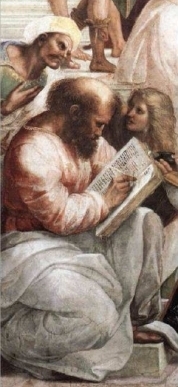|
|
 |
I PARCHI LETTERARI® IN CALABRIA “JOURNEYS TO THE FUTURE
OF MEMORY” - I PARCHI LETTERARI IN THE MARQUISATE
OF CROTONE: PYTHAGORAS
PYTHAGORAS,
he who persuades the public squares
Pythagoras (in Greek “Pythagòras”, from "pithia",
Apollo’s temple or from pèithō = to persuade + agora =
public square, literally, he who persuades the public
square).
Some historians doubt the historical truth of this
figure. Ancient biographers attribute him with a
semi-divine nature, which allowed him to perform
miracles, including the healing of illnesses. He founded
a school of philosophy that was named after him, but
convinced of the superiority of the oral tradition with
respect to the written word, he failed to leave behind
any form of documentation. Moreover, since he prohibited
his followers to write about and to speak about his own
theories with strangers, it is impossible to ascertain
which ideas were his own and which were those of his
disciples.
 Pythagoras’s
life covered almost the entire 6th Century B.C.: he was
born in Samo around 572 B.C., he died in Metaponto
around 494. The most important sources regarding his
biography date to the first few centuries A.D. Porphyry
and Iamblichus, the authors of two biographies on the
scientist, were both from the third century A.D. Pythagoras’s
life covered almost the entire 6th Century B.C.: he was
born in Samo around 572 B.C., he died in Metaponto
around 494. The most important sources regarding his
biography date to the first few centuries A.D. Porphyry
and Iamblichus, the authors of two biographies on the
scientist, were both from the third century A.D.
An exposition of the Pythagorean theorem was made by
Aristotle (4th Century B.C.); his mathematical theory is
described by Proclus (5th Century A.D.).
Crotone’s fame owes much to the prolific Pythagorean
school that is estimated to have been founded by the
great teacher between 600 B.C. and 500 B.C. According to
legend, it was the God Apollo who preordained him to go
to Crotone and transmit his knowledge. The philosopher
and mathematician chose this destination after having
consulted with the Oracle at Delphi, who directed him to
the city. Certainly, he was familiar with the
scientific-medical, artistic and philosophic culture of
the city, as well as its favourable political climate.
In fact, its domination extended to the other Ionian
cities. Once he reached Crotone, Pythagoras managed to
immediately earn the favour of the city’s inhabitants,
due to his wide-ranging knowledge, which he had learned
from teachers like Anaximander and the experiences he
had during his long journeys to the Middle East and
Egypt. Once consensus had grown, he governed “aristocratically”.
Inside the city walls, a magnificent white marble
construction was built for him, surrounded by gardens
and porticoes, which was destined for the teacher’s
school. It was called the House of the Muses. In this
school, the teacher developed his ideas, which included:
metempsychosis, the theory that the soul lives on after
the body dies; this was followed by the eschatological
doctrine, according to which the soul transmigrates into
different life forms, perfecting itself until it reaches
God; dualism, which deals with the cosmos and the
surrounding atmosphere; the theory according to which
the number is the arché (the principle of all things);
the construction of decimal-based arithmetic and his
famous theorem.
|



